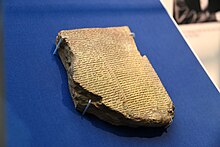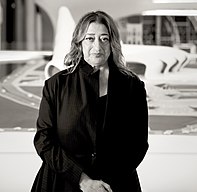Culture of Iraq
[1] Mesopotamian legacy went on to influence and shape the civilizations of the Old World in different ways such as inventing writing, mathematics, law, astrology and many more fields.The country has one of the longest written traditions in the world including architecture, literature, music, dance, painting, weaving, pottery, calligraphy, stonemasonry and metalworking.The influence of Sumerian and the East Semitic language Akkadian on each other is evident in all areas, from lexical borrowing on a substantial scale to syntactic, morphological, and phonological convergence.An ancient Mesopotamian poem gives the first known story of the invention of writing:Because the messenger's mouth was heavy and he couldn't repeat [the message], the Lord of Kulaba patted some clay and put words on it, like a tablet.The later Standard Babylonian version compiled by Sîn-lēqi-unninni dates from the 13th to the 10th centuries BCE and bears the incipit Sha naqba īmuru[15]("He who Saw the Abyss", in modern terms: "He who Sees the Unknown").[16] Some of the most important figures of 20th century Iraqi literature include, Safa Khulusi Maruf Rusafi and Daisy Al-Amir, Jamil Zahawi, Jawahiri and Khazal al Majidi.In 1959 when King Faisel II's government was overthrown, the Cinema and Theater General organization came into existence with the purpose of promoting the political goals of the new regime both in documentaries and features.Typical were documentaries like the 1969 Al Maghishi Project, which showcased the government's irrigation campaigns and the 1967 A Wedding in Heaven, which celebrates the air force and their weapons system.In 1981, the government commissioned Egyptian filmmaker Salah Abouseif to make Al-Qadisiya, a period epic recounting the triumph of the Arabs over the Persians in 636 AD.Likewise Mohamed Shukri Jameel's melodramatic The Great Question (al-Mas' Ala Al-Kubra) cast British actor Oliver Reed as the vicious Lt-Col Gerard Leachman who is righteously killed in the 1920 Iraqi revolution.The Iraq national football team were the 2007 AFC Asian Cup Champions after defeating Saudi Arabia in the final, held in Jakarta, Indonesia.In 2006, Iraq reached the football final of the 2006 Asian Games in Doha, Qatar, after defeating former FIFA World Cup semi-finalists South Korea and eventually finished as runners-up, winning silver.[19] Tablets found in ancient ruins in Iraq show recipes prepared in the temples during religious festivals - the first cookbooks in the world.[19] Ancient Iraq, or Mesopotamia was home to a sophisticated and highly advanced civilization, in all fields of knowledge - including the culinary arts.[19] Today, the cuisine of Iraq reflects this rich inheritance, as well as strong influences from the culinary traditions of neighbouring Persia, Turkey, and the Syria region.[19] Some popular dishes include Kebab (often marinated with garlic, lemon, and spices, then grilled), Gauss (grilled meat sandwich wrap, similar to Döner kebab), Bamieh (lamb, okra, and tomato stew), Quzi (lamb with rice, almonds, raisins, and spices), and salad in pita, Kubbah (minced meat ground with bulghur wheat, or rice and spices), Masgûf (grilled fish with pepper and tamarind), and Maqluba (a rice, lamb, tomato, and aubergine dish).Contemporary Iraq reflects the same natural division as ancient Mesopotamia,[21] which consisted of Assyria in the arid northern uplands and Babylonia in the southern alluvial plain.






HistoryPeopleLanguagesCuisineReligionLiteratureTelevisionCinemaWorld Heritage SitesCoat of armsNational anthemArabicculturalTigris and Euphrates riversMesopotamiacradle of civilisationOld WorldwritingmathematicsastrologyarchitecturepaintingweavingpotterycalligraphystonemasonrymetalworkingIslamicIslamic Golden AgeBaghdadAbbasid CaliphateArt of MesopotamiaIraqi artAshurbanipalchariotvisual artMesopotamianconfronted animalsMaster of AnimalsTree of LifeQ'ranicYahya Al-WasitiMaqamatal-HaririLanguages of IraqMesopotamian ArabicKurdishTurkishNeo-AramaicChaldeanAssyrianArabic scriptTurkish alphabetNeo-Aramaic languagesSyriac scriptMandaicShabakiArmenianConstitution of IraqTurkmenSyriacnative tonguelanguage isolatelogographicKish tabletFalkensteinlate UrukSumeriansSemiticAkkadiansEast SemiticAkkadianSprachbundSumerian literatureAkkadian literatureIraqi literatureEpic of GilgameshSumerian languageMiddle Bronze AgeSumerian cuneiformproto-writingBabylonianBabylonian literatureinvention of writingKulabaEnmerkar and the Lord of ArattaSumerianancient Mesopotamian mythologyepic poemGilgameshThird Dynasty of UrincipittabletsSîn-lēqi-unninnilibrary ruinsAssyrian kingAl-MutanabiArabic languageMuslim worldHouse of WisdomSafa KhulusiMaruf RusafiDaisy Al-AmirJamil ZahawiJawahiriKhazal al MajidiArchitecture of MesopotamiaAbbasid architectureAssyrian sculptureZaha Hadidurban planningcourtyard housezigguratsRifat ChadirjiHisham N. AshkouriCinema of IraqKing Faisal II of IraqAbd al-Karim QasiminvadedMusic of IraqMusic of MesopotamiaAssyrian/Syriac folk musicMuhammad al-Qubbanchimaqam al-IraqiSport in IraqFootball
